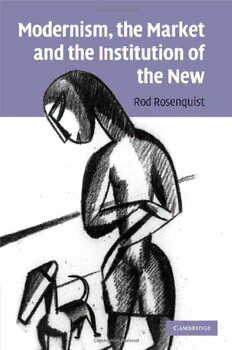
Modernism, the Market and the Institution of the New PDF
222 Pages·2009·1.107 MB·English
Most books are stored in the elastic cloud where traffic is expensive. For this reason, we have a limit on daily download.
Preview Modernism, the Market and the Institution of the New
Description:
Modernism remains deeply connected to ideas of innovation, and this has created problems for successive generations of writers. For example, how does one create an original work when the 'new' has already been established, marketed and institutionalised? Rod Rosenquist's study focuses on the writers and poets who emerged after Modernism's high-water mark year of 1922, in which Ulysses, The Waste Land and the early Cantos were published. Seeking to refine our own understanding of the high modernists through the frequent difficulties encountered by the generation that succeeded them, this study discusses issues of cultural value, the relationship of history to innovation, and the market for new works in an era already dominated by the likes of Joyce, Eliot and Pound. Containing illuminating examinations of Wyndham Lewis, Laura Riding and Henry Miller, this study will be invaluable reading for those interested in Modernism and its complicated legacy.
See more
The list of books you might like
Most books are stored in the elastic cloud where traffic is expensive. For this reason, we have a limit on daily download.
